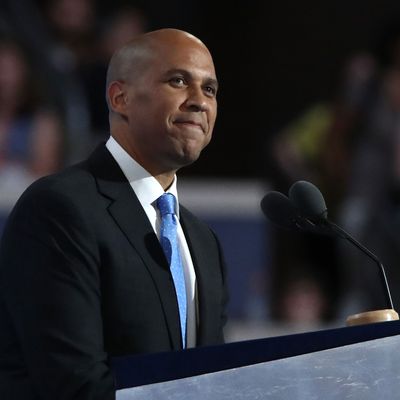
Last Saturday, Tom Perez defeated Keith Ellison in the race for DNC chair — and some on the left promptly concluded that any further attempt to pull the Democratic Party in their ideological direction would be a fool’s errand.
This fatalism was unjustified but not entirely baseless. Ellison had declared his bid shortly after the 2016 election and quickly garnered the support of prominent Democrats, both “Establishment” and “progressive.” For some left-wing activists, the party’s initial embrace of the Minnesota congressman — who had supported Bernie Sanders in 2016 and a “Robin Hood tax” in the House — had symbolic weight. It suggested that the Democrats were interested in the energy and vision that the left hoped to bring to the party.
Tom Perez’s entry suggested the opposite. Shortly after the former Labor Secretary declared his candidacy, the New York Times reported that the Obama White House was anxious to derail Ellison’s bid:
In a sign of the discord gripping the party, President Obama’s loyalists, uneasy with the progressive Mr. Ellison, have begun casting about for an alternative, according to multiple Democratic officials close to the president.
So, in the eyes of some Sandernistas, the DNC race became a referendum on whether the Democratic Party sees them as a force to be nurtured or one to be stymied. And Perez’s victory signaled the latter.
But pessimistic leftists who take this dour view should remember what a wise Italian political consultant once said: It is better to be feared than loved.
Do some in the Democratic Establishment have a distaste for Bernie Sanders and the social democratic vision he espouses? Yes. But does that Establishment feel compelled to appease the left — in ways both substantive and symbolic — to a degree that’s unprecedented in the party’s modern history? Without question.
The last DNC chair was a vocal opponent of medical marijuana — and a staunch defender of the payday-loan industry. Chuck Schumer’s preferred candidate in the race to succeed her was a black, Muslim populist who wants to decriminalize weed and tax Wall Street speculation. The Establishment “stooge” who ran against him was a Labor Secretary who extended employment protections to home health-care workers, expanded access to overtime pay, and passed a rule preventing retirement advisers from fleecing their clients.
And, despite the (alleged) support of the party’s popular ex-president, Perez barely fended off Ellison’s challenge.
The DNC race was a testament to the Democratic left’s vitality, not its impudence.
That vitality was affirmed again, on Tuesday, when Cory Booker joined Bernie Sanders in backing a bill to allow American consumers to reimport cheaper drugs from Canada.
Last month, Sanders introduced an amendment to a budget resolution that would have instructed the Senate to draft legislation allowing for the reimportation of cheaper pharmaceuticals from our neighbor to the north. The amendment was largely symbolic — its passage would not have bound the Senate to lift the ban on reimportation.
Nonetheless, 13 Democratic senators, including Booker, voted against it, and found themselves instantly branded as corporate shills — who’d rather protect drug-industry profits than the indigent sick — by every principled leftist with a Twitter account.
Sanders, himself, accused his colleagues of lacking “guts,” and then predicted “in the coming weeks and months you’re going to see many of them develop the courage to stand up to pharma.”
On Tuesday, Booker had his “come to Bernie” moment. After the January vote, the New Jersey senator claimed that he had only opposed the measure because it had lacked language ensuring safety standards. This rationale wasn’t terribly convincing — especially considering how large the pharmaceutical industry looms in the Garden State (and on Booker’s OpenSecrets page). But now, Booker has put his co-sponsorship where his mouth is, offering his support for Sanders’s latest attempt to expand free trade in pharmaceuticals. (The new bill includes provisions preventing the Canadians from selling us poison.)
Of course, drug reimportation is a long way away from single-payer health care (which is a long way away from collective ownership of the means of production). And there are perfectly sound reasons for leftists to do much of their organizing outside the Democratic Party.
Still, Booker’s support for Sanders’s bill shows how far his party has come since the heyday of the DLC.
Centrist Democrats once tried to distance themselves from the left ahead of their presidential runs. Now, they do the opposite. Come 2020, the left’s two least-favorite Democratic presidential candidates may well be a senator who supports ending the War on Drugs; expanding access to Medicare; and taxing carbon emissions — and a governor who effectively banned fracking in his state; raised the minimum wage to $15; established a system of paid family leave; and pushed for free public college for working-class kids.
This isn’t to say that leftists should stop worrying and learn to love Andrew Cuomo. But they should appreciate the fact that he’s learned to fear them.






























